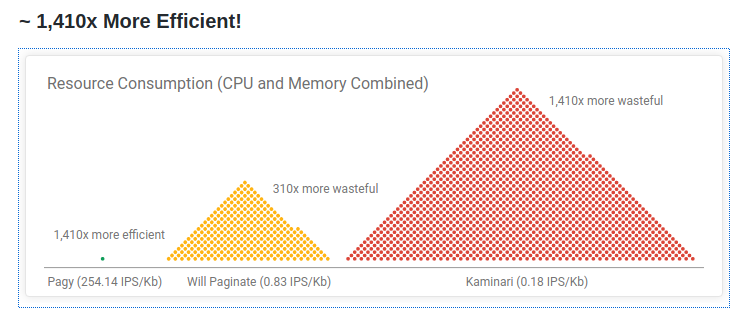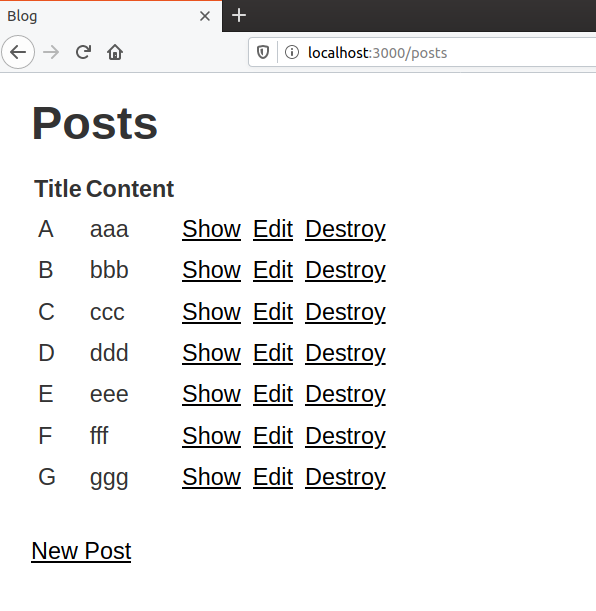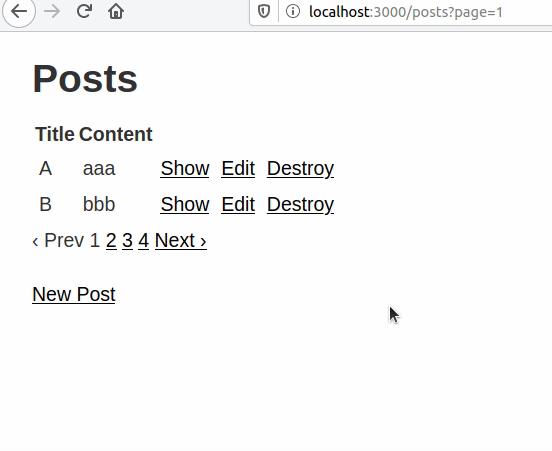Faster pagination with Pagy
Bài đăng này đã không được cập nhật trong 5 năm
Pagy is the lightest and the fastest pagination libaray for rails currently. It's roughly about 100 lines,
Here are the benchmarks on performance comparison against Kaminari and Will paginate




For more detailed comparison check here
Demo
Let's create a blog.
rails new blog
cd blog
rails g scaffold Post title content
rails db:migrate
And lets add some dummy data

Create a new pagy.rb file inside config/initializers
# encoding: utf-8
# frozen_string_literal: true
# Pagy initializer file (3.7.3)
# Customize only what you really need and notice that Pagy works also without any of the following lines.
# Should you just cherry pick part of this file, please maintain the require-order of the extras
# Extras
# See https://ddnexus.github.io/pagy/extras
# Backend Extras
# Array extra: Paginate arrays efficiently, avoiding expensive array-wrapping and without overriding
# See https://ddnexus.github.io/pagy/extras/array
# require 'pagy/extras/array'
# Countless extra: Paginate without any count, saving one query per rendering
# See https://ddnexus.github.io/pagy/extras/countless
# require 'pagy/extras/countless'
# Pagy::VARS[:cycle] = false # default
# Elasticsearch Rails extra: Paginate `ElasticsearchRails::Results` objects
# See https://ddnexus.github.io/pagy/extras/elasticsearch_rails
# require 'pagy/extras/elasticsearch_rails'
# Searchkick extra: Paginate `Searchkick::Results` objects
# See https://ddnexus.github.io/pagy/extras/searchkick
# require 'pagy/extras/searchkick'
# Frontend Extras
# Bootstrap extra: Add nav, nav_js and combo_nav_js helpers and templates for Bootstrap pagination
# See https://ddnexus.github.io/pagy/extras/bootstrap
# require 'pagy/extras/bootstrap'
# Bulma extra: Add nav, nav_js and combo_nav_js helpers and templates for Bulma pagination
# See https://ddnexus.github.io/pagy/extras/bulma
# require 'pagy/extras/bulma'
# Foundation extra: Add nav, nav_js and combo_nav_js helpers and templates for Foundation pagination
# See https://ddnexus.github.io/pagy/extras/foundation
# require 'pagy/extras/foundation'
# Materialize extra: Add nav, nav_js and combo_nav_js helpers for Materialize pagination
# See https://ddnexus.github.io/pagy/extras/materialize
# require 'pagy/extras/materialize'
# Navs extra: Add nav_js and combo_nav_js javascript helpers
# Notice: the other frontend extras add their own framework-styled versions,
# so require this extra only if you need the unstyled version
# See https://ddnexus.github.io/pagy/extras/navs
# require 'pagy/extras/navs'
# Semantic extra: Add nav, nav_js and combo_nav_js helpers for Semantic UI pagination
# See https://ddnexus.github.io/pagy/extras/semantic
# require 'pagy/extras/semantic'
# UIkit extra: Add nav helper and templates for UIkit pagination
# See https://ddnexus.github.io/pagy/extras/uikit
# require 'pagy/extras/uikit'
# Multi size var used by the *_nav_js helpers
# See https://ddnexus.github.io/pagy/extras/navs#steps
# Pagy::VARS[:steps] = { 0 => [2,3,3,2], 540 => [3,5,5,3], 720 => [5,7,7,5] } # example
# Feature Extras
# Headers extra: http response headers (and other helpers) useful for API pagination
# See http://ddnexus.github.io/pagy/extras/headers
# require 'pagy/extras/headers'
# Pagy::VARS[:headers] = { page: 'Current-Page', items: 'Page-Items', count: 'Total-Count', pages: 'Total-Pages' } # default
# Support extra: Extra support for features like: incremental, infinite, auto-scroll pagination
# See https://ddnexus.github.io/pagy/extras/support
# require 'pagy/extras/support'
# Items extra: Allow the client to request a custom number of items per page with an optional selector UI
# See https://ddnexus.github.io/pagy/extras/items
# require 'pagy/extras/items'
# Pagy::VARS[:items_param] = :items # default
# Pagy::VARS[:max_items] = 100 # default
# Overflow extra: Allow for easy handling of overflowing pages
# See https://ddnexus.github.io/pagy/extras/overflow
# require 'pagy/extras/overflow'
# Pagy::VARS[:overflow] = :empty_page # default (other options: :last_page and :exception)
# Metadata extra: Provides the pagination metadata to Javascript frameworks like Vue.js, react.js, etc.
# See https://ddnexus.github.io/pagy/extras/metadata
# you must require the shared internal extra (BEFORE the metadata extra) ONLY if you need also the :sequels
# require 'pagy/extras/shared'
# require 'pagy/extras/metadata'
# For performance reason, you should explicitly set ONLY the metadata you use in the frontend
# Pagy::VARS[:metadata] = [:scaffold_url, :count, :page, :prev, :next, :last] # example
# Trim extra: Remove the page=1 param from links
# See https://ddnexus.github.io/pagy/extras/trim
# require 'pagy/extras/trim'
# Pagy Variables
# See https://ddnexus.github.io/pagy/api/pagy#variables
# All the Pagy::VARS are set for all the Pagy instances but can be overridden
# per instance by just passing them to Pagy.new or the #pagy controller method
# Instance variables
# See https://ddnexus.github.io/pagy/api/pagy#instance-variables
# Pagy::VARS[:items] = 2 # default
# Other Variables
# See https://ddnexus.github.io/pagy/api/pagy#other-variables
# Pagy::VARS[:size] = [1,4,4,1] # default
# Pagy::VARS[:page_param] = :page # default
# Pagy::VARS[:params] = {} # default
# Pagy::VARS[:anchor] = '#anchor' # example
# Pagy::VARS[:link_extra] = 'data-remote="true"' # example
# Rails
# Rails: extras assets path required by the helpers that use javascript
# (pagy*_nav_js, pagy*_combo_nav_js, and pagy_items_selector_js)
# See https://ddnexus.github.io/pagy/extras#javascript
# Rails.application.config.assets.paths << Pagy.root.join('javascripts')
# I18n
# Pagy internal I18n: ~18x faster using ~10x less memory than the i18n gem
# See https://ddnexus.github.io/pagy/api/frontend#i18n
# Notice: No need to configure anything in this section if your app uses only "en"
# or if you use the i18n extra below
#
# Examples:
# load the "de" built-in locale:
# Pagy::I18n.load(locale: 'de')
#
# load the "de" locale defined in the custom file at :filepath:
# Pagy::I18n.load(locale: 'de', filepath: 'path/to/pagy-de.yml')
#
# load the "de", "en" and "es" built-in locales:
# (the first passed :locale will be used also as the default_locale)
# Pagy::I18n.load({locale: 'de'},
# {locale: 'en'},
# {locale: 'es'})
#
# load the "en" built-in locale, a custom "es" locale,
# and a totally custom locale complete with a custom :pluralize proc:
# (the first passed :locale will be used also as the default_locale)
# Pagy::I18n.load({locale: 'en'},
# {locale: 'es', filepath: 'path/to/pagy-es.yml'},
# {locale: 'xyz', # not built-in
# filepath: 'path/to/pagy-xyz.yml',
# pluralize: lambda{|count| ... } )
# I18n extra: uses the standard i18n gem which is ~18x slower using ~10x more memory
# than the default pagy internal i18n (see above)
# See https://ddnexus.github.io/pagy/extras/i18n
# require 'pagy/extras/i18n'
# Default i18n key
# Pagy::VARS[:i18n_key] = 'pagy.item_name' # default
Let's modify the PostsController to include the pagy module, and modify the default index action.
class PostsController < ApplicationController
include Pagy::Backend # <===============
before_action :set_post, only: [:show, :edit, :update, :destroy]
# GET /posts
# GET /posts.json
def index
# @posts = Post.all
@pagy, @posts = pagy(Post.all) # <===============
end
end
Include the frontend module inside application_helper.rb
module ApplicationHelper
include Pagy::Frontend
end
And finally, let's modify the view file to include the pagination buttons.
<p id="notice"><%= notice %></p>
<h1>Posts</h1>
<table>
<thead>
<tr>
<th>Title</th>
<th>Content</th>
<th colspan="3"></th>
</tr>
</thead>
<tbody>
<% @posts.each do |post| %>
<tr>
<td><%= post.title %></td>
<td><%= post.content %></td>
<td><%= link_to 'Show', post %></td>
<td><%= link_to 'Edit', edit_post_path(post) %></td>
<td><%= link_to 'Destroy', post, method: :delete, data: { confirm: 'Are you sure?' } %></td>
</tr>
<% end %>
</tbody>
</table>
<%== pagy_nav(@pagy) %> # <===============================
<br>
<%= link_to 'New Post', new_post_path %>
And that's it. We're done.

Study material
All rights reserved